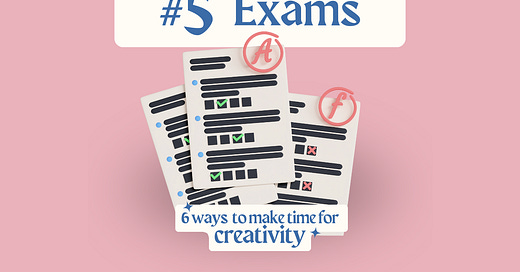6 ways to make time for creativity: #5 exams
There are more options out there than you might think!
One of the major barriers to teaching creativity in the UK is exams.
Simply put, creativity is not a priority for most of the exam boards.
That’s a real shame, and it’s made worse by the fact that UK society puts so much emphasis on certification, which pressurises us to regularly enter students for exams.
Creativity is hard to examine — but not impossible! Several exam boards allow scope for creativity.
If exam pressure makes it difficult for you to include creativity in lessons, here are a few options that will foster creativity.
Trinity College of London allow their candidates to perform one of their own compositions
ABRSM’s Jazz Exams require improvisation
make the most of the syllabus flexibility of the Music Teacher’s Board. With MTB you can submit pieces for approval, and there’s no reason a student can’t submit their own composition, provided it meets the benchmarking requirements.
The Maestro Online is a new exam board whose syllabus is focused on pop arrangements. Candidates are encouraged to embellish the suggested arrangements and add their own intros and outros. In higher grades, candidates are encouraged to get even more creative. Quoting from the syllabus for Grade 7, “Restyling a piece is permissible, such as playing a traditional pop song in a latin style or a blues. The significant improvisation/embellishment of an entire section (instrumental, middle 8/bridge, verse or chorus) to create a "solo" section is strongly encouraged.”
Persuasion
Some people are remarkably conservative about using just one exam board and/or syllabus and you may have to work hard to persuade them to experiment. Here are some arguments and strategies I’ve used with success:
“how about we try out doing one ‘creative’ exam and then go back to ‘normal’?”
“all the exam boards mentioned are accredited by Ofqual, which means that although the specifics requirements of each syllabus differ, the overall difficulty level is roughly equal”
“in order to be successful as a musician nowadays, you need to stand out. Being able to compose and/or improvise elevates young students amongst their peers”
Creativity is valuable
It’s that last point that I often find most effective. Being able to improvise, arrange and compose makes students more interesting for music conservatories. In the long run, creativity makes students more employable.
Actually it is valuable for a whole host of other reasons: elevated student self-worth, deeper musicianship… I could go on! But sometimes you have to make an economic argument too. Hopefully this post will help you do so!






Great post. I was trained in the conservatory method. The first thing I had to teach myself to do once I started my career as a professional pianist was to read lead sheets, improvise, transpose, and arrange open score. There are probably a handful of pianists out there who build careers playing nothing but the classics at a very high level. The rest of us need "creativity training" to build a viable career.